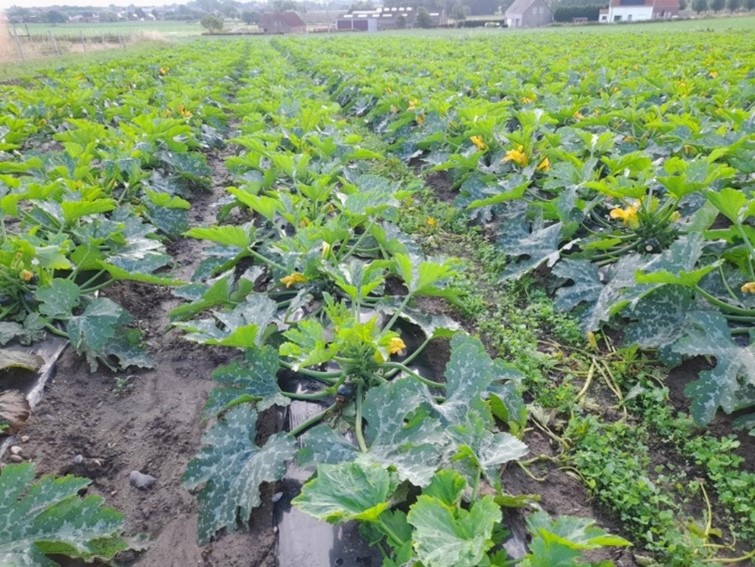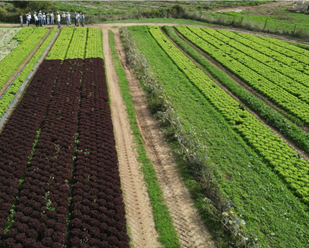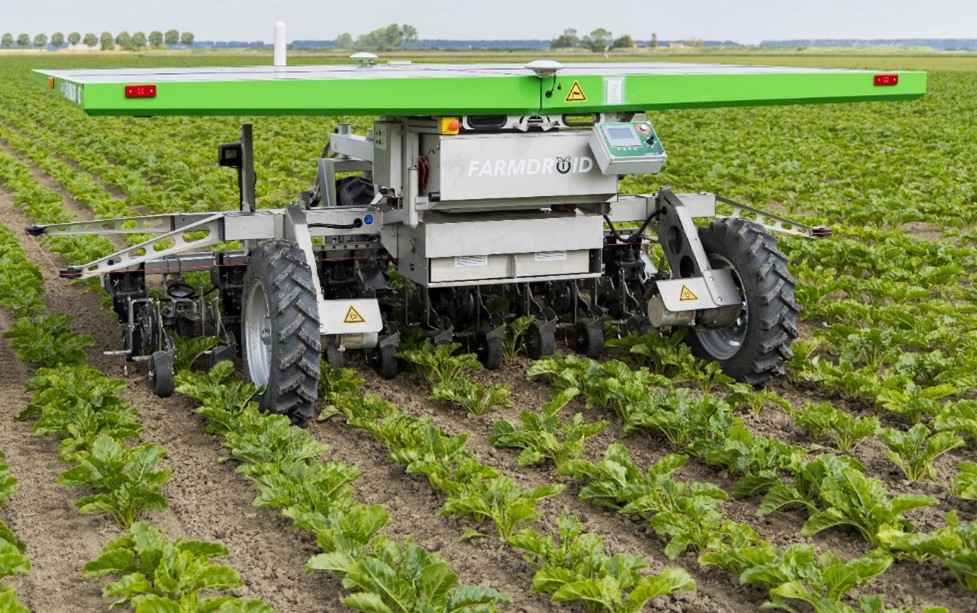Good IPM practices and success stories:
Examples from European vegetables farms
Outdoor vegetables farmes throughout Europe are implementing many techniques to reduce the use of pesticides. We share with you some success stories based on different methods from the IPMWorks hubs
(Finland) To avoid weeds, vegetable farmers in Finland often cover the raised beds (e.g. in cabbage or lettuce) with a biodegradable film. This technique has also other advantages: the temperature of the ground rises in the spring more rapidly than usually and moisture is retained in the ground beneath it. This stimulates the growth of the plants. During the growing season chemical weed control is not needed anymore, only the planting holes are weeded by hand if necessary. Moreover less weeding hours are needed with a biofilm. However there is a side problem in lettuce after using film for several years: the presence of the click beetle larvae (Agriotes obscurus) has increased so pest monitoring is needed to follow up the pest pressure. Furthermore stronger films are needed, because these used biofilms do not stay for long time. Jonathan De Mey, the Belgian hubcoach from Inagro also share his experience with the use of organic mulches in zucchini. “Farmers are getting more and more interested in using organic mulches after we organised a demo within the Belgian hub. I believe the use of organic mulches in vegetables production will increase even more.”

Pestmonitoring in cabbages covered by biofilm in Finland
(Belgium) A farmer asked the support of the hub coach Jonathan to implement his idea for sowing of clover between ridges of zucchini to prevent erosion. A test showed that the runoff of soil was much reduced in the ridges with clover in between. This technique is also very transferable to other crops and to organic farming. Jonathan was most proud that the farmer contacted him to cooperate because that’s the way to go: farmers have an idea and the hub helps to implement it. The farmers was also open to invite other farmers to his field.
(Belgium) Jolien, hubcoach of the strawberry hub saw the use of the banker plants, Lobularia maritima during a cross-visit to Wageningen University and experimented with it on the applied research station Inagro. Because this banker plant is flowering long they provide more food to the beneficials insects. Jolien introduced this technique in her hub and her farmers changed their mindset by planting not only strawberries but also banker plants. Jolien: “I’m most proud of the change in mindset of my farmers and this technique is now also tested in leek fields to control trips.”

Sowing of clover between ridges of zucchini to prevent erosion in Belgium
(Portugal) A demo event on a Portuguese farm illustrated the importance of hedges in open air vegetables to promote biological protection through natural limitation of pests by attracting and keeping the population of parasitoids or predators. With the goal of having a more complex environment, ecological infrastructures are installed or maintained in the fields. This can be hedges, strips of flowers or other structures that provide food and shelter to specific insects. These structures are kept to attract predators or parasitoids of the pest(s) the farmer wants to control. The choice of plant species is important to ensure that the right insects are attracted to the fields and will control the pest. This practice can also be complementary to the release of commercialized auxiliary insects. Farmers often have several different crops and it is a difficult topic to introduce in open air vegetables, but the Portuguese hub coach Barbara noticed that the farmers are getting more open for this topic. Minds are shifting from seeing hedges as impossible to opportunities to experiment with it. Hub members/farmers are learning good IPM examples by organising demo’s and cross-visits to other countries. This way of exchanging knowledge between farmers facilitated by an agronomic scientist speeds the process of implementing IPM through Europe.

Hedges from flowerstrips between different crops to conserve the biological control in Portugal
(The Netherlands) One of the Dutch farmers has bought a FarmDroid, a fully electric sowing and hoeing robot. The machine can sow up to approximately 20 hectares during the season and then also hoe. The FarmDroid is charged using solar panels. Natasja, the Dutch hub coach says: ”This robot makes it possible to hoe both between the crop rows and in the crop rows. The great advantage of this machine is that weeds can be controlled more effectively and sustainably with fewer crop protection products”. Because of the high cost, this is not feasible for all farmers but buying the robot as a group can be a solution.

FarmDroid to sow and weed automatically based on solar energy in the Netherlands
About IPMworks
IPMworks (full project name: “An EU-wide farm network demonstrating and promoting cost-effective IPM strategies”) is a H2020 financed project gathering 31 partners from 16 European countries, coordinated by the French National Research Institute for Agriculture, Food, and the Environment (INRAE).
The project objective is to promote the adoption of IPM strategies, based on an EU-wide network of farmers, who will progress further in the adoption of IPM through peer-to-peer learning and joint efforts, as well as demonstrate to other farmers that holistic IPM “works”; i.e. allows a low reliance on pesticides with better pest control, reduced costs, and enhanced profitability.
The project partners coordinate existing networks promoting IPM and launched new hubs of farms in regions or sectors where IPM pioneers were not yet engaged in relevant networks. Advisors coordinating hubs have a major role in facilitating knowledge sharing, coaching farmers to find their own IPM solutions, and organizing local demonstration activities.
IPMworks stimulates access to the IPM Decisions platform and provides information on IPM methods. It will collect data for comparing IPM strategies and share results and dissemination material through channels widely used by farmers, broadcasting IPM success stories. It will organise training and produce training materials, targeting both farmers outside the network and advisory services, to prepare for the future dissemination of the peer-to-peer learning approach and the general adoption of IPM throughout the EU.
Contacts details
Belgian hub coach: Inagro, Belgium
Jonathan De Mey
Jonathan.demey@inagro.be
Outdoor vegetables sector leader: Inagro, Belgium
Sabien Pollet
sabien.pollet@inagro.be
IPMworks coordinator: INRAE, France
Nicolas Munier-Jolain
nicolas.munier-jolain@inrae.fr